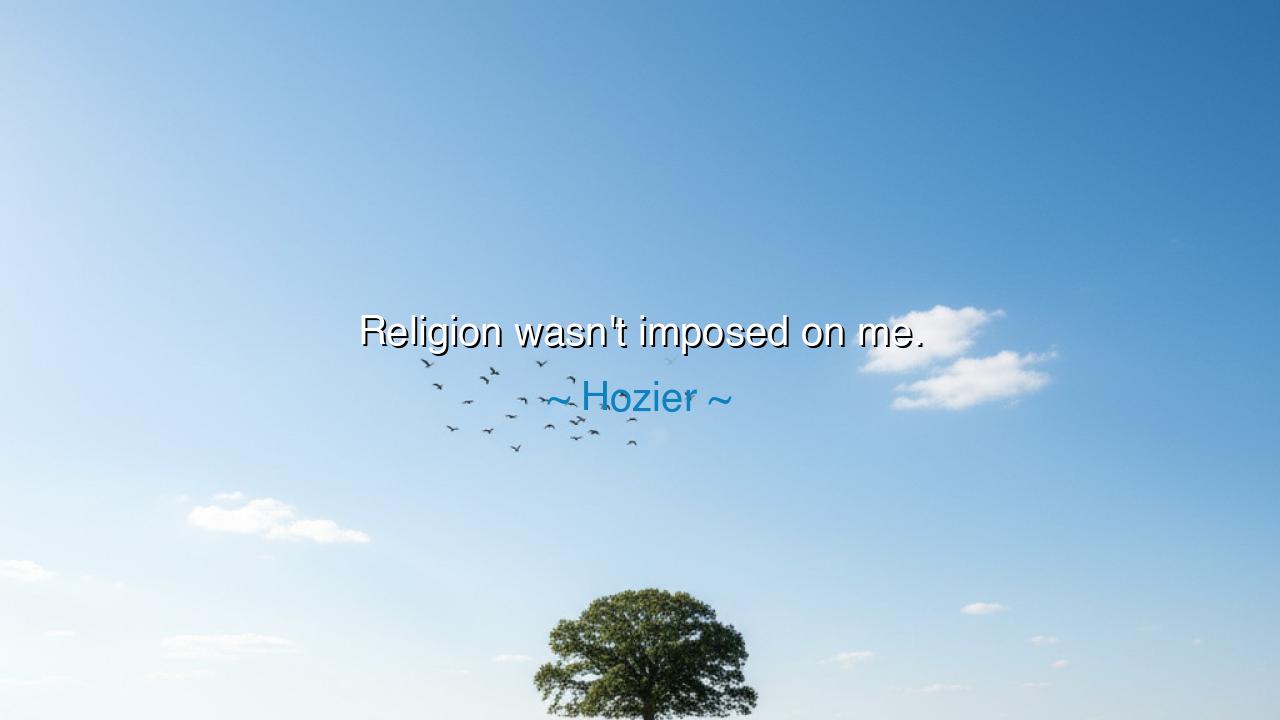
Religion wasn't imposed on me.






Hear, O seeker of truth, the words of the poet and singer Hozier: “Religion wasn’t imposed on me.” They are simple, yet heavy with meaning, like a seed that carries within it the shape of a great tree. In these words lies not only personal memory but a declaration of freedom. For many have known religion as a chain, pressed upon them by family, by culture, by law, until their faith was less a song of the soul than a burden on the shoulders. But here is a man who speaks of a different path: one in which belief is not commanded but invited, not forced but discovered.
Consider the nature of imposed religion. Across ages and empires, rulers and priests often demanded obedience not only in action but in thought. Children were taught before they could reason, nations enforced rites before they could question, and faith was too often tied not to love but to fear. Such faith, though loud and disciplined, rarely grew deep roots, for it sprang not from the heart but from compulsion. To say “religion wasn’t imposed on me” is to claim the rare gift of a soul left free to wonder, to seek, and to choose its own relation to the divine.
History teaches us well the dangers of compulsion. Recall the Spanish Inquisition, where men and women were commanded to profess belief under pain of death. What grew from such soil was not devotion but terror, not love of God but fear of fire. Many obeyed outwardly while inwardly their spirits withered. Contrast this with the early days of the American colonies, where some came seeking a land where conscience could breathe freely. Though imperfectly lived, their vision carried a truth: that only a faith freely chosen can be genuine.
So too do we see examples of freedom’s strength. Consider Siddhartha, the Buddha, who left behind the religion of his ancestors, not because it was imposed but because he was allowed to seek. His path was one of choice, of deep reflection, of listening to his own heart beneath the Bodhi tree. And from that freedom came a teaching that endured for centuries. So it is with Hozier’s words: they echo the truth that when faith is allowed to grow in freedom, it bears fruit of sincerity.
The meaning, then, is clear: religion not imposed is religion alive. It is not ritual without spirit, nor obedience without love. It is the faith of those who stand before the divine not out of compulsion, but out of desire. And when the heart chooses freely, even doubt becomes part of devotion, for the soul wrestles honestly, not out of fear of punishment but out of longing for truth.
The lesson for us is simple yet powerful. Do not impose belief upon others, not even upon your children, your friends, your neighbors. Teach them, yes; share your wisdom, yes; but let them breathe. Let them find their own path to the sacred. For truth coerced is no truth at all; only when chosen does it shine with authenticity. As Hozier reminds us, freedom in matters of the spirit is the soil in which the deepest faith grows.
Practical counsel follows. When you speak of your beliefs, speak with humility, not as one who forces but as one who invites. When you meet others whose faith differs from yours, do not condemn, but listen, and you may learn. When you raise children, show them many paths, and trust that the light of truth will call them in its own time. In this way, you honor both the divine and the dignity of the human spirit.
Therefore, O child of tomorrow, remember the wisdom of these words: “Religion wasn’t imposed on me.” Seek to live in such freedom yourself, and to offer it to others. For in freedom, faith becomes not a prison but a song, not a burden but a gift. And when faith is chosen freely, it can light the world with a radiance that compulsion can never produce.






AAdministratorAdministrator
Welcome, honored guests. Please leave a comment, we will respond soon